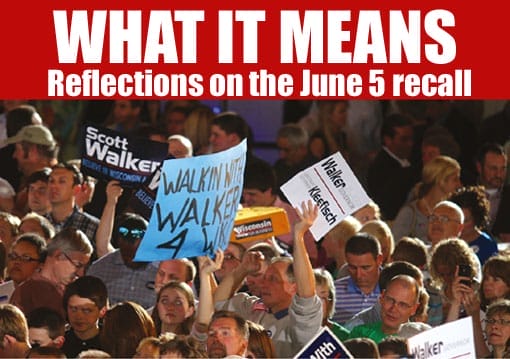By Fred Siegel
Why did the labor left insist the on the self-defeating campaign to recall Scott Walker?
An able perspective would have noted the recent string of liberal defeats stretching from the New Jersey and Virginia gubernatorial races, to the Scott Brown senatorial victory in Massachusetts, to the Republican legislative gains in state after state, to the failure right here in Wisconsin to oust Supreme Court Justice David Prosser. The Walker recall was bound to be tough going, as a left-wing mobilization produced a right-wing counter-mobilization.
But hotheaded liberals decided to double down. Their recall effect was driven by the memory of two events that didn’t happen. The first is the memory widespread among liberals that their victory in the 2008 presidential election was the harbinger of a fundamental leftward shift in American politics. The second, which came into play when the leftward shift was stymied, was the belief that billionaires pulling the puppet strings of the Tea Partiers were to blame for their losses.
The first misreading impelled the second, trapping labor liberals inside smoke and mirrors of their concocting. They were sure that they had been cheated.
In the wake of the 2008 election, Andy Stern, then president of the Service Employees International Union and a close ally of the Obama White House, boasted that public sector unions “are the most powerful political force in the country.” And so it might have seemed when the public unions became the primary beneficiaries of the 2009 stimulus bill.
But like 1930s unionism, the once serviceable Keynesian solution had dissolved. The ensuing travail pushed voters into a closer look at the workings of the public sector, and they didn’t like what they saw.
The bitter conflict between Scott Walker, the self-described “Tea Party governor” who stripped public unions of their pivotal ability to automatically collect dues from their members, and the labor movement is intense because an overgrown government, arguably a bearable burden during times of prosperity, threatened to capsize Wisconsin’s fiscal boat.
Work-a-day citizens were caught between rising property taxes to pay for the public sector and declining home values. They bridled at the soaring cost and inefficiency of government. One of Walker’s most effective tropes was to point across Wisconsin’s southern border to Illinois, where the union stranglehold has produced near bankruptcy.
In Illinois, Walker noted, “they’re now shutting down state facilities, laying off tons of public employees, and cutting Medicaid, while we added money to Medicaid and avoided massive layoffs.”
But caught up in their own rhetoric about the evils of Walker and the Darth Vader-like power of the Koch brothers, liberal militants in Wisconsin couldn’t acknowledge the effects of austerity on the 2010 elections. Nor could they acknowledge the implication of Kathleen Falk’s defeat in the Democratic primary. Enveloped in a righteous anger, they couldn’t respect their fellow citizens’ worry that public unions threatened the Madisonian underpinning of America politics.
You didn’t have to be a Tea Partier to fear that government had, by way of the unions, gone into business for itself.
Fred Siegel is scholar in residence at St. Francis College in Brooklyn and a contributing editor of the Manhattan Institute’s City Journal






